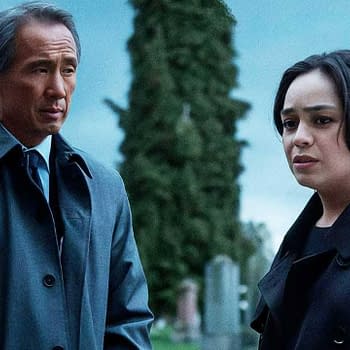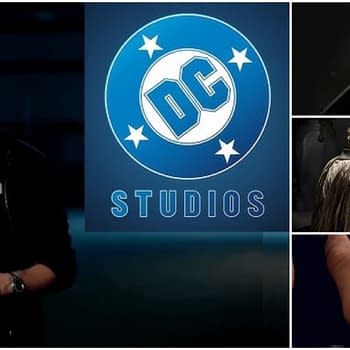Posted in: Movies, Recent Updates, Video Games | Tagged: bioshock, call of duty, entertainment, hideo kojima, ken levine, Metal Gear Solid IV: Guns of the Patriots, Metalgear Solid V: Ground Zeroes, Richard Garriott, Ultima, video games
The Oddball, Ambivalent Fun of Metal Gear Solid V: Ground Zeroes – Look! It Moves! By Adi Tantimedh
Adi Tantimedh writes:
Metal Gear Solid V: Ground Zeroes has been criticized for being a only two hours' worth of gameplay, but after I played it, I came away feeling that the series was never only about the gameplay.
Ground Zeroes may seem like a glorified demo with its one campaign level and the possibility of completing it in less than half an hour if you're really good at stealth and pattern recognition, but it's interesting that only the Guardian review has commented on its political content. Its subtitle "Ground Zeroes" is clearly a reference to 9/11 and visually, the prison camp is clearly this world's Guantanamo Bay. The term "black site" isn't repeated constantly throughout the game just for shock value. Even as Snake sneaks through the camp trying to extract two prisoners, it's clear the prisoners there have been broken by physical and psychological torture, ignored by the rest of the world. It's a piece of escapism that forces you to think about real world horrors. The series has always embodied the conflict of players just wanting to play a game and being forced to pay attention to the story. For those that are interested in stories and political and social ideas, it's rich and deep, if messy.
I doubt anyone who has never played a Metal Gear Solid game before would have bought Ground Zeroes. It's a direct sequel to the last game Peace Walker and a prologue to the much bigger and longer game The Phantom Pain, which still doesn't have a release date. The story and characters in Ground Zeroes would not make much sense to anyone who hadn't played the previous game as it's steeped in continuity. It's part of a convoluted story about Snake, a American special ops soldier disillusioned by the betrayals of realpolitik during the Cold War who left America to form his idea of a utopian mercenary army that's its own independent state, renting its services to countries that don't have strong armies to defend themselves, only to eventually become one of the world's most wanted terrorists. The consequences of his actions, the tragedies and wars that resulted form the labyrinthine and tangled plot of the whole series, including the origin of the original game's hero Solid Snake, another special ops soldier, revealed as the clone of the original Snake. Metal Gear Solid IV: Guns of the Patriots forming the conclusion to the whole saga. The whole story is at least as complicated as the history of the Marvel Universe.
Unlike the rah-rah attitude about war in games like Call of Duty, the Metal Gear Solid series have always been deeply ambivalent. This is demonstrated even in its fundamental design, which is to encourage stealth and bypassing enemies rather than rushing into every situation with all guns blazing and not stopping until everyone is dead. To run and gun in a Metal Gear Solid game is to get killed very quickly and having to restart. Your score is actually penalized and reduced the more people you kill in the game, and you get more in-game rewards and unlocks the smaller your bodycount, and especially if you don't kill anyone.
The main theme of the series is the privatization of war and its effects on people. Every character in the series is a production and victim of war, not just the prisoners of the black site. In previous games, the villains were all tragic and there were often alternate ways to beat them that didn't involve shooting or blowing them up. In Snake Eater, the third game, you could beat the aging master sniper, The End, by either finding a hidden sniper rifle to pick him off or simply not playing the game for a whole week, which the game's internal clock will recognize and when you returned, you would find that The End has died of old age.
The Sorrow was already dead, a ghost, and the way to beat him was not to shoot or fight him, but to have Snake die himself in order to face his trials in a purgatorial afterlife. Those were two of the most subversive designs in the history of action games and far more unexpected and innovative than just a mere shoot 'em up, and they contributed to Kojima's themes of guilt and attrition in a fascinating marriage of idea and gameplay. There's also a slightly creepy preoccupation with the suffering of women in the games, as shown in the cyborg villains in Metal Gear Solid IV who were traumatised victims of war transformed into surreal, fetishistic killing machines, and the predicament of Paz, the double agent in Ground Zeroes whose rescue fuels the plot of the entire game. The villains also often have overt sexual and S&M undertones, none of them unconscious or unintentional.
Ground Zeroes may be a short game, but it's a deep one. Its open sandbox design offers endless replay value where players can choose different ways to complete the campaign and several of the short side missions. There is the option to rescue all the prisoners in the prison and even abduct the guards rather than sneak by or kill them. Kojima deliberately packed the game full of audio tape recordings of the characters' diaries, backstories, interrogations, even music with the clear intention that players should care about the lore. Paz' increasingly sad audio diaries detail her change of heart when she was supposed to spy on Snake and his base.
One side mission has Snake assigned to assassinate two rogue Marines but actually gives you the choice of not killing them but extracting them instead, which not only gets you an achievement but also offers up a slightly different ending narration that reveals the Marines were not cold-hearted killers but seemed to suffer remorse and trauma for the killings they'd committed, even maiming themselves as acts of penance. Players often have a choice of playing it straight or going completely hogwild and crazy, like just climbing into a tank and blowing up all the guards, screw stealth action! I bet some player out there is going to attempt to knock out and extract every single guard in the camp.
[youtube]http://www.youtube.com/watch?v=elMikUGFfqw[/youtube]
Hideo Kojima is a life-long reader of comics, history, technology and military books, not to mention an avid movie fan, and people have accused him of being a frustrated filmmaker in his emphasis on the importance of story in his games. His cutscenes often feature elaborate camera moves and choreography, and the dialogue is often portentious with meaning and somewhat stilted. Metal Gear Solid IV: Guns of the Patriots still holds the record for the longest cutscenes ever in a single video game. It wasn't just one or two, but a lot of them, with enough plot to fill a whole TV series. That was as clear as it got that Kojima wanted players to pay attention to his off-kilter 5-minutes-from-now political military espionage saga that began life as a 2D top-down game into full-on Hollywood Blockbuster-style saga with full brooding orchestral score and major actors like Kiefer Sutherland. Metal Gear Solid IV was also the first piece of post-911 pop fiction that addressed the notion that increasingly corporatised private military companies were villains since War was big business, at least five years before Hollywood took up that idea.
Sitting next to the serious themes are moments of absurd, geeky, fourth wall-bursting humour and self-referential Easter eggs, like a cigarette-smoking monkey that's an arms dealer's pet in Metal Gear Solid IV, or the jokes about the homoerotic relationship between Snake and Kaz Miller, or the option of kissing the poster of a popular celebrity in the second game, and one side mission in Ground Zeroes has Snake rescuing an undercover operative who turns out to be Kojima himself. The tone of the series has always called back to the tone of 70s and 80s macho action movies, reveling in their existential glamour and deconstructing and making fun of them at the same time. The end of Metal Gear Solid IV featured, after over 10 hours of playing with high-tech weaponry, just two old men, way past their prime, in a fist fight while a melancholy 70s-style ballad played in the background, boiling it all down to how ridiculously macho and futile their whole campaign has been, that it's been about men trying to assert their masculinity and find a purpose all along.
The Metal Gear Solid series has always been an odd, rich mix of ideas and obsessions beyond just being a "tactical espionage action" game. In many ways, it's an auteurist series the same way certain film directors are celebrated as auteurs. The games are soaked through with Kojima's social commentary, obsessions and fetishes and quirks in a way that more generic, committee-designed games can't possibly be. The closest Western counterparts to Kojima we might have in the videogame are probably Ken Levine, director of the Bioshock games and Richard Garriott, who created the Ultima role-playing games that set the tone for fantasy RPGs ever since. However, neither of them have put any really deep eccentricity or quirks into their games as much as Kojima does, which might be a Japanese trait of being unafraid and unironic about putting deliberately silly and absurd jokes next to very serious moments.
Ground Zeroes is a small but precise piece of pop culture that taps into the zeitgeist. Its context and design forces you into thinking about the horrors of black sites, extraordinary rendition and fascism without making any speeches about it. Whether you want to pay $30 dollars for it is entirely your call (or wait six months to a year where it'll become much cheaper), but it's richer than many bigger games, a tech demo and a taster for The Phantom Game.
Tactical espionage typing at lookitmoves@gmail.com
Follow the official LOOK! IT MOVES! twitter feed at http://twitter.com/lookitmoves for thoughts and snark on media and pop culture, stuff for future columns and stuff I may never spend a whole column writing about.
Look! It Moves! © Adisakdi Tantimedh

















